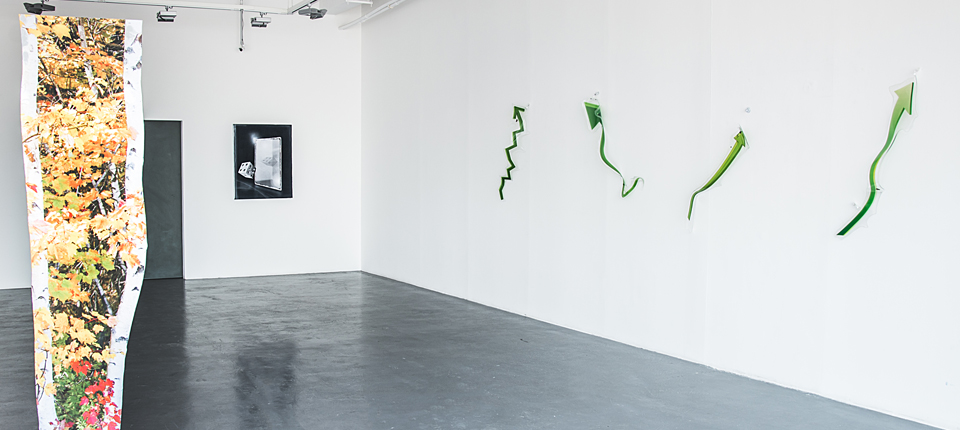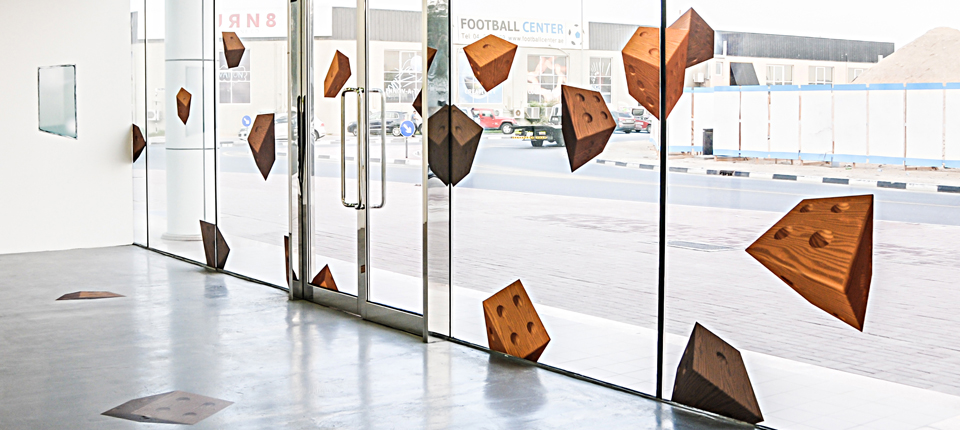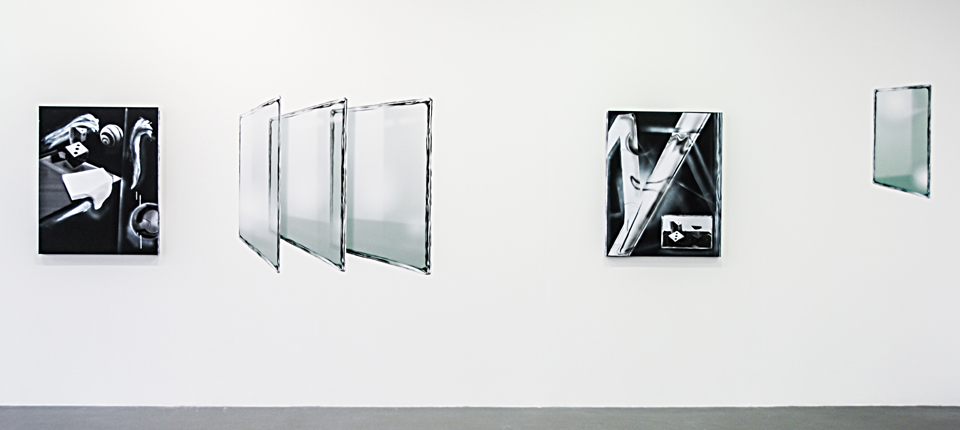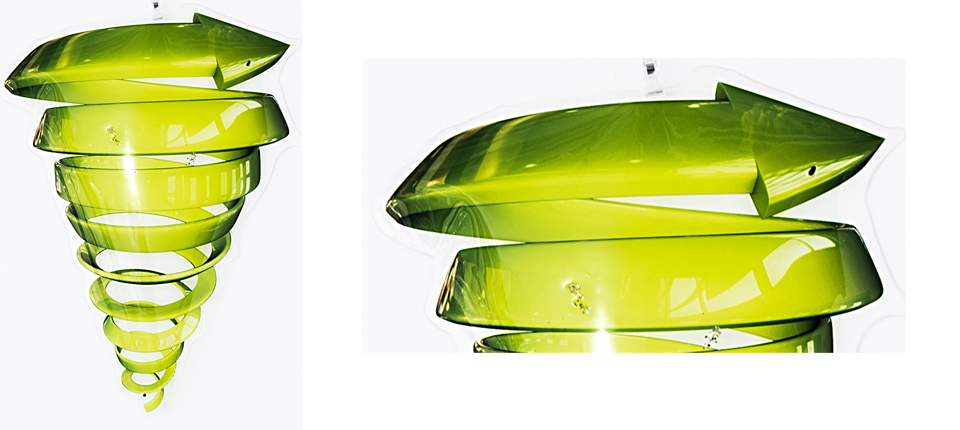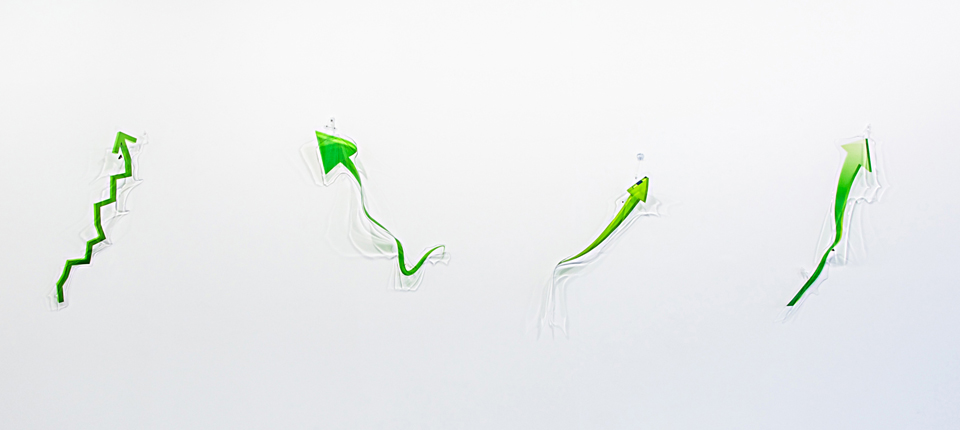Exhibition X
Urgently, “Yesterday”: Florian Auer and Katja Novitskova, curated by Mamali Shafahi
Glossary of terms (listed in some particular order)
need it yesterday. 1 (idiomatic) To need something immediately or urgently; to need something that is already late 2 In Urdu and Hindi, the word ‘tomorrow’ and ‘yesterday’ is the same.
contemporary adjective 1 living or occurring at the same time: the event was recorded by a contemporary historian. • dating from the same time: this series of paintings is contemporary with other works in an early style. 2 belonging to or occurring in the present: the tension and complexities of our contemporary society. • following modern ideas or fashion in style or design: contemporary art. noun ( pl. contemporaries ) a person or thing living or existing at the same time as another: he was a contemporary of Darwin. • a person of roughly the same age as another: my contemporaries at school. DERIVATIVES contemporarily adverb, contemporariness noun ORIGIN mid 17th cent.: from medieval Latin contemporarius, from con- ‘together with’ + tempus, tempor- ‘time’ (on the pattern of Latin contemporaneus and late Latin contemporalis).
art noun 1 the expression or application of human creative skill and imagination, typically in a visual form such as painting or sculpture, producing works to be appreciated primarily for their beauty or emotional power: the art of the Renaissance | great art is concerned with moral imperfections | she studied art in Paris. • works produced by such skill and imagination: his collection of modern art | an exhibition of Mexican art | [ as modifier ] : an art critic.• creative activity resulting in the production of paintings, drawings, or sculpture: she’s good at art. 2 (the arts) the various branches of creative activity, such as painting, music, literature, and dance: the visual arts | [ in sing. ] : the art of photography. 3 (arts) subjects of study primarily concerned with the processes and products of human creativity and social life, such as languages, literature, and history (as contrasted with scientific or technical subjects): the belief that the arts and sciences were incompatible | the Faculty of Arts. 4 a skill at doing a specified thing, typically one acquired through practice: the art of conversation. PHRASES art for art’s sake used to convey the idea that the chief or only aim of a work of art is the self-expression of the individual artist who creates it. art is long, life is short proverb there is so much knowledge (or skill) to acquire that a lifetime is not sufficient. art of war the strategy, tactics, and techniques of combat. ORIGIN Middle English: via Old French from Latin ars, art- .
polyurethane noun a synthetic resin in which the polymer units are linked by urethane groups, used chiefly as constituents of paints, varnishes, adhesives, and foams. verb [ with obj. ] (usu. as adj. polyurethaned) coat or protect with paint or varnish of this kind.
production noun 1 the action of making or manufacturing from components or raw materials, or the process of being so manufactured: the production of chemical weapons | it is no longer in production • the harvesting or refinement of something natural: nonintensive methods of food production. • the total amount of something that is manufactured, harvested, or refined: steel production had peaked in 1974. • the creation or formation of something as part of a physical, biological, or chemical process: excess production of collagen by the liver. • [ as modifier ] denoting a car or other vehicle that has been manufactured in large numbers. 2 the process of or financial and administrative management involved in making a movie, play, or record: the movie was still in production | [ as modifier ] : a production company. • a movie, play, or record, esp. when viewed in terms of its making or staging: this production updates the play and sets it in the sixties. • [ in sing. ] the overall sound of a musical recording; the way a record is produced: the record’s production is gloriously relaxed.PHRASES make a production of do (something) in an unnecessarily elaborate or complicated way. ORIGIN late Middle English: via Old French from Latin productio(n-), from producere ‘bring forth’ (see produce).
fractal Mathematics noun a curve or geometric figure, each part of which has the same statistical character as the whole. Fractals are useful in modeling structures (such as eroded coastlines or snowflakes) in which similar patterns recur at progressively smaller scales, and in describing partly random or chaotic phenomena such as crystal growth, fluid turbulence, and galaxy formation. adjective relating to or of the nature of a fractal or fractals: fractal geometry. ORIGIN 1970s: from French, from Latin fract- ‘broken,’ from the verb frangere.
appropriate adjective suitable or proper in the circumstances: a measure appropriate to a wartime economy. verb [ with obj. ] 1 take (something) for one’s own use, typically without the owner’s permission: his images have been appropriated by advertisers. 2 devote (money or assets) to a special purpose: there can be problems in appropriating funds for legal expenses. DERIVATIVES appropriately adverb [ sentence adverb ] : appropriately, the first recital will be given at the festival, appropriateness |-itnis|noun, appropriator noun ORIGIN late Middle English: from late Latin appropriatus, past participle of appropriare ‘make one’s own,’ from ad- ‘to’ + proprius ‘own, proper.’
recognize verb [ with obj. ]1 identify (someone or something) from having encountered them before; know again: I recognized her when her wig fell off | Julia hardly recognized Jill when they met. • identify from knowledge of appearance or character: Pat is very good at recognizing wildflowers. • (of a computer or other machine) automatically identify and respond correctly to (a sound, printed character, etc.). 2 acknowledge the existence, validity, or legality of: the defense is recognized in Mexican law | he was recognized as an international authority | [ with clause ] : it is important to recognize that a variety of indirect forms of discrimination operate. • officially regard (a qualification) as valid or proper: these qualifications are recognized by the Department of Education | (as adj. recognized) : courses that lead to recognized qualifications. • grant diplomatic recognition to (a country or government): they were refusing to recognize the puppet regime.• show official appreciation of; reward formally: his work was recognized by an honorary degree from Georgetown University. • (of a person presiding at a meeting or debate) call on (someone) to speak. DERIVATIVES recognizer noun ORIGIN late Middle English (earliest attested as a term in Scots law): from Old French reconniss-, stem of reconnaistre, from Latin recognoscere ‘know again, recall to mind,’ from re- ‘again’ + cognoscere ‘learn.’
semiotics pluralnoun [ treated as sing. ] the study of signs and symbols and their use or interpretation. DERIVATIVES semiotic adjective, semiotically adverb, semiotician noun ORIGIN late 19th cent.: from Greek sēmeiotikos ‘of signs,’ from sēmeioun ‘interpret as a sign.’
hyperreal adjective 1 exaggerated in comparison to reality. 2 (of artistic representation) extremely realistic in detail. DERIVATIVES hyperrealism noun, hyperrealist adjective, hyperrealistic adjective, hyperreality noun
spectacle noun a visually striking performance or display: the acrobatic feats make a good spectacle | the show is pure spectacle. • an event or scene regarded in terms of its visual impact: the spectacle of a city’s mass grief. PHRASES make a spectacle of oneself draw attention to oneself by behaving in a ridiculous way in public. ORIGIN Middle English: via Old French from Latin spectaculum ‘public show,’ from spectare, frequentative of specere ‘to look.’
“always already” could not be found.
Definitions taken from the Oxford American English dictionary Mac widget, 2014
Florian Auer (b. 1984) is an artist from Augsburg, Germany. He studied American Culture at Ludwig-Maximilians-Universität in Munich before attending the Munich Academy of Fine Arts. He then enrolled at Städelschule in Frankfurt, where he graduated in 2012. Auer has participated in numerous exhibitions, some of which were at Cell Project Space, London; Lothringer 13, Munich; Andratx, Plama de Mallorca; and MMK, Frankfurt, among others. His work is currently represented by Galerie Kraupa-Tuskany Zeidler, Berlin. Auer currently lives and works in Berlin.
Katja Novitskova (b. 1984) is an artist and curator born in Tallin, Estonia. She graduated with a Master of Science in Digital Media from the University of Lubeck, Germany, in 2007, and in 2010 from the Sandberg Instituut in Amsterdam from the Graphic Design department. Novitskova has participated in numerous exhibitions and curatorial projects both within and outside of Europe, some of which include: (group exhibition) Mawu-Lisa, New Gallery London, London, UK; (group exhibition) Oggetto Soggetto, Centro de Arte 2 de Mayo, Madrid, Spain; (curated project) Post Internet Survival Guide, Future Gallery and Gentili Apri, Berlin; and (curated exhibition) TruEYE surView, W139, Amsterdam. Novitskova lives and works in Amsterdam and is currently an artist in residence at the Rijksakademie van beeldende kunsten.


